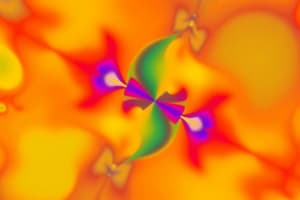Podcast
Questions and Answers
What year did Benoît Mandelbrot propose the theory of fractal geometry?
What year did Benoît Mandelbrot propose the theory of fractal geometry?
- 2003
- 1993
- 1975 (correct)
- 1967
In which applications is fractal geometry NOT mentioned to have significant influence?
In which applications is fractal geometry NOT mentioned to have significant influence?
- Earthquake prediction
- Medicine
- Astronomy (correct)
- Engineering
Which landmark achievement was awarded to Benoît Mandelbrot in 1993?
Which landmark achievement was awarded to Benoît Mandelbrot in 1993?
- Nobel Prize in Physics
- Fields Medal
- Wolf Prize for Physics (correct)
- Japan Prize
What characteristic defines fractals, as described in Mandelbrot's work?
What characteristic defines fractals, as described in Mandelbrot's work?
What was one of Benoît Mandelbrot's roles at IBM when he first started there?
What was one of Benoît Mandelbrot's roles at IBM when he first started there?
Flashcards are hidden until you start studying
Study Notes
Benoît Mandelbrot
- Polish-born French mathematician, born in 1924, died in 2010.
- Founder of fractal geometry.
- Developed methods to analyze data, revealing patterns previously thought to be random or chaotic.
- Fractal geometry focuses on self-similar structures across different scales.
- Fractal patterns are found in nature (coastlines, trees, clouds) and data sets (economic & weather data).
Key Milestones
- 1958: Joined IBM and began analyzing data for noise patterns.
- 1967: Discovered patterns within seemingly random data.
- 1975: Proposed the theory of fractal geometry.
- 1993: Awarded the Wolf Prize for Physics.
- 2003: Received the Japan Prize.
Applications of Fractal Geometry
- Medicine: Understanding complex biological processes.
- Engineering: Visualizing and analyzing intricate systems.
- Cosmology: Studying patterns and formations in space.
- Economics & Finance: Analyzing financial markets.
- Earthquake Prediction: Identifying patterns suggesting earthquake activity.
- Disease Diagnostics: Predicting and potentially diagnosing diseases.
The Mandelbrot Set
- A visual representation of a mathematical construct formed from complex numbers.
- Plotted on computers, revealing an infinitely repeating shape.
- Complex due to the infinite repetition of points and patterns.
Studying That Suits You
Use AI to generate personalized quizzes and flashcards to suit your learning preferences.





